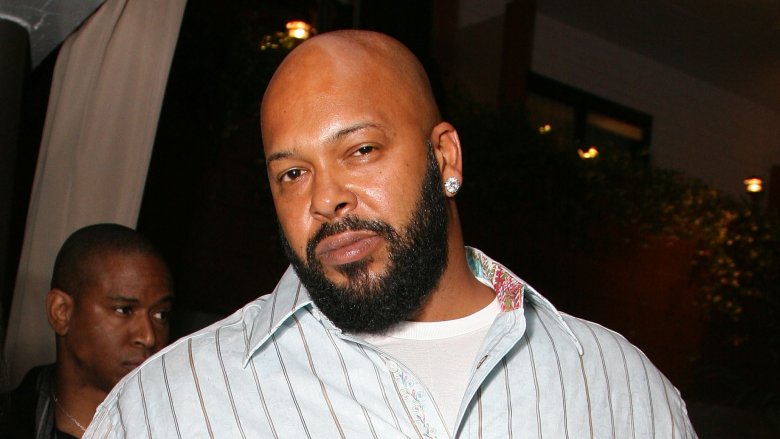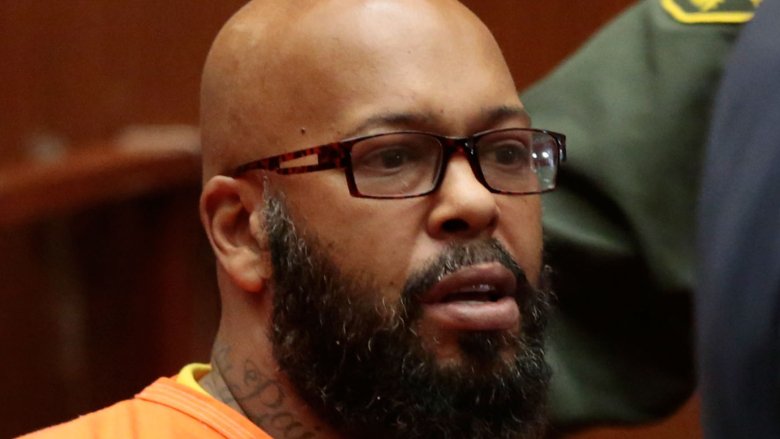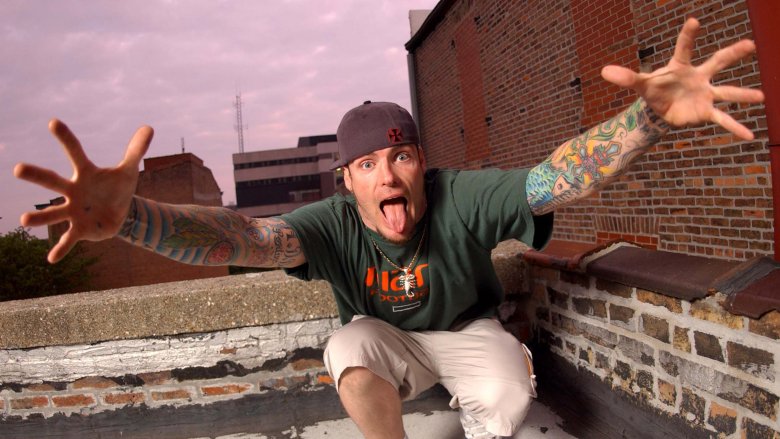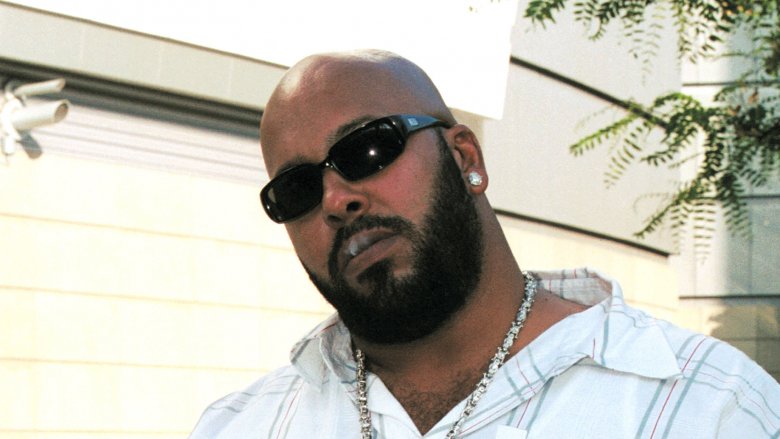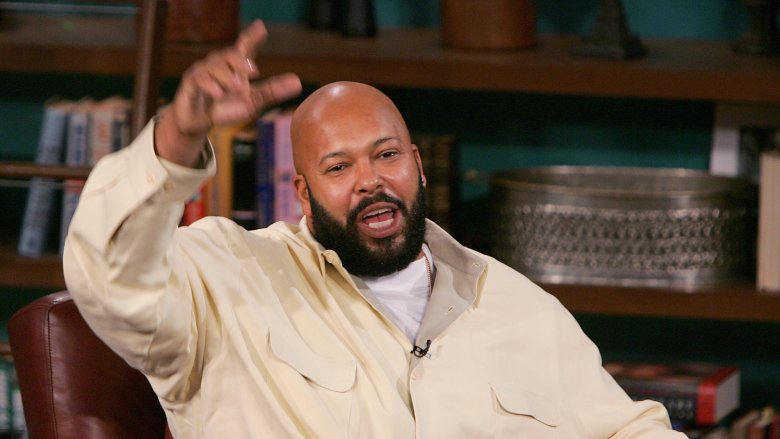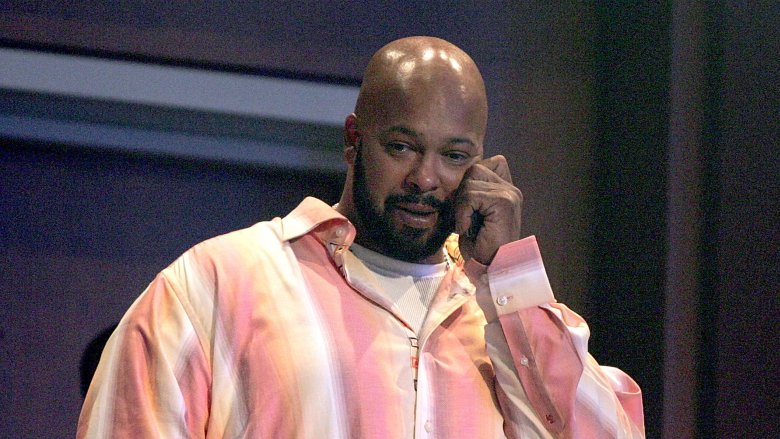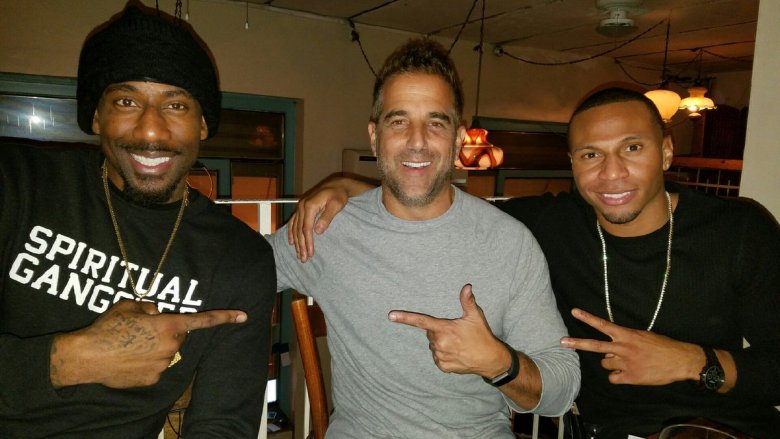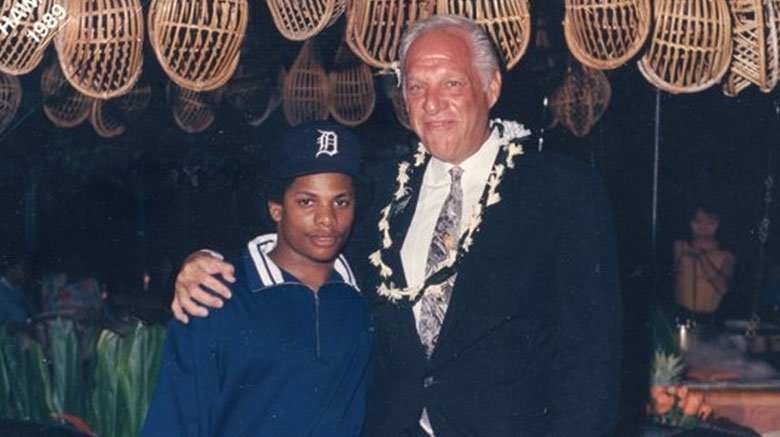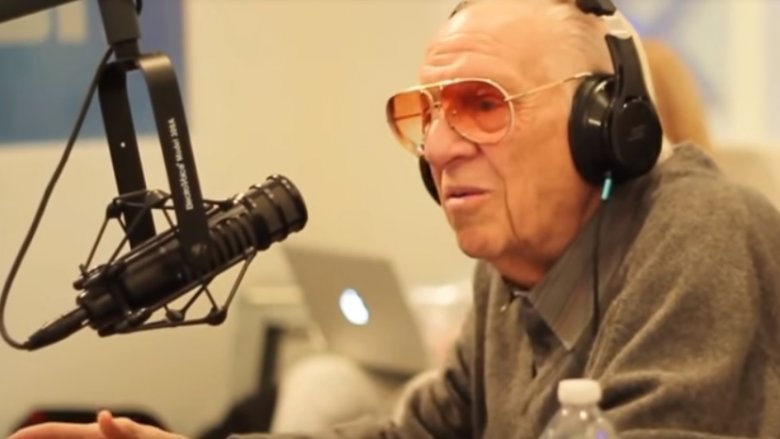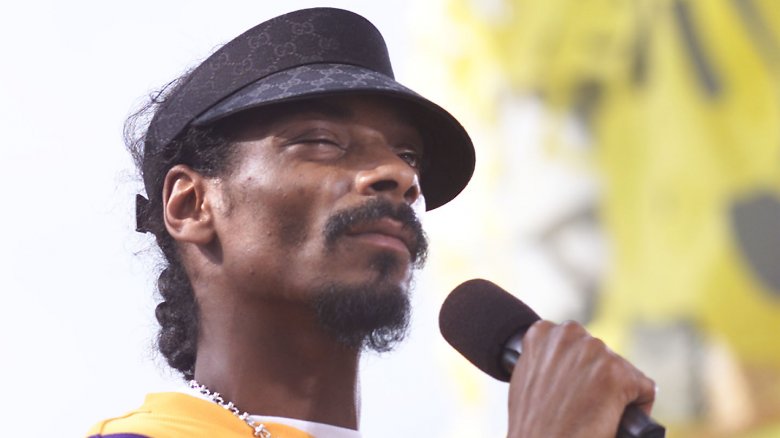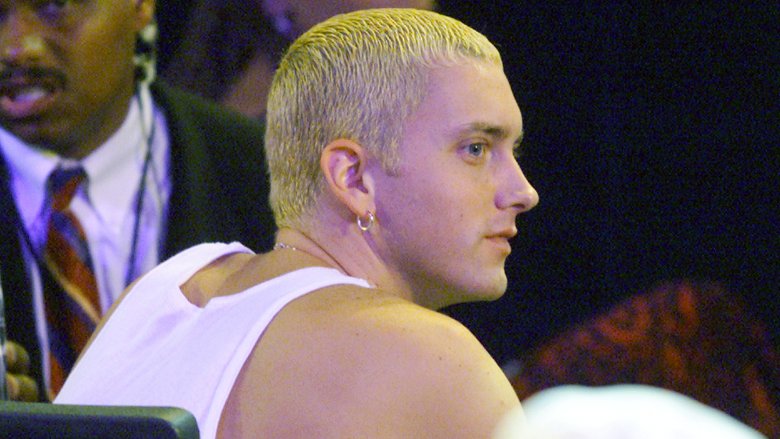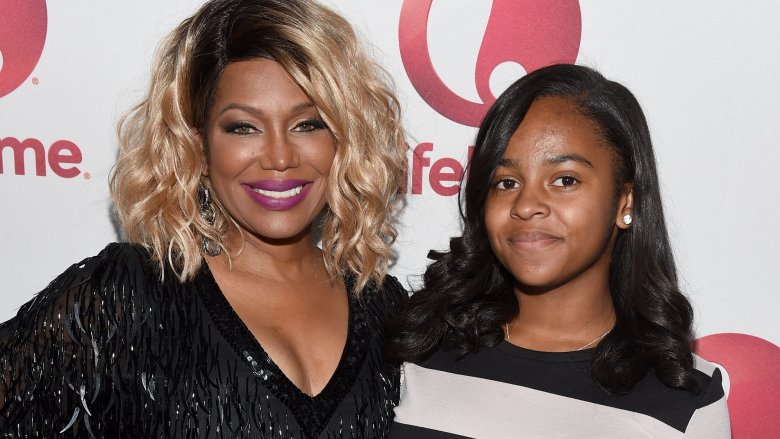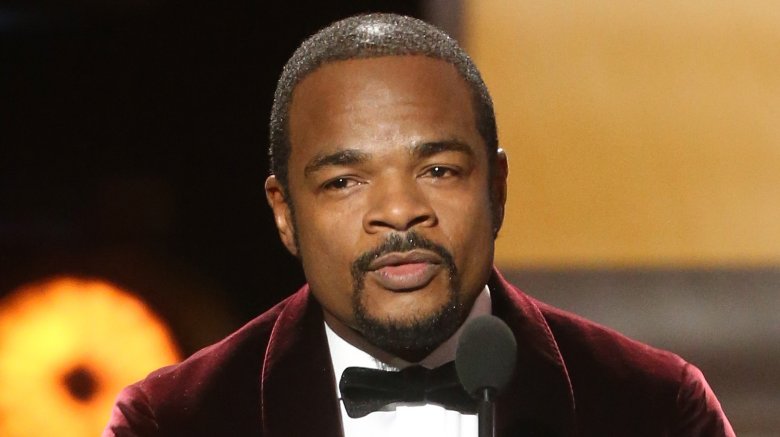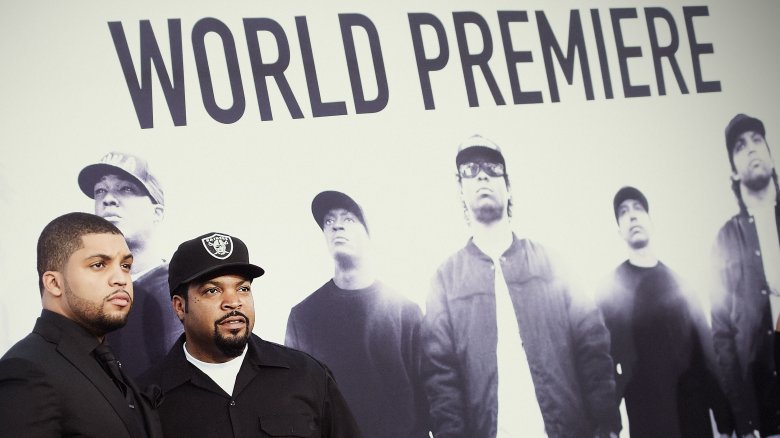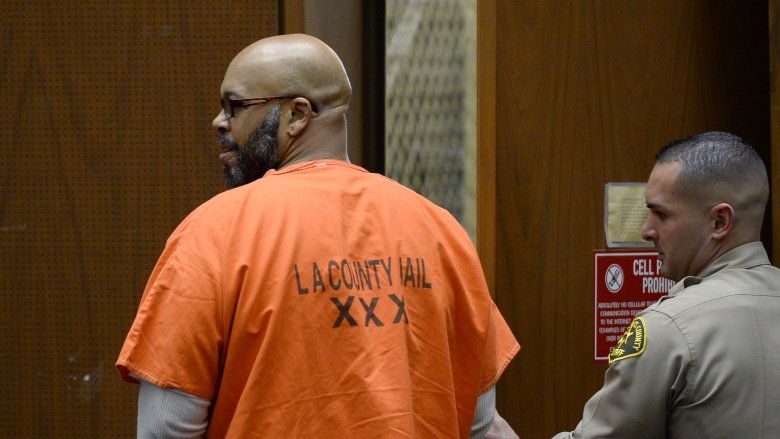Inside Suge Knight's Scary Past
Even if you're completely unfamiliar with gangsta rap, chances are you've still heard of Marion "Suge" Knight, the infamous founder of Death Row Records. With a huge personality and a hulking frame to back it up, Knight literally took the rap game by force in the early '90s, allegedly using intimidation and violence to silence his rivals and build an empire that has been compared to Motown. His controversial tactics worked, and many of the artists on his roster—which included the likes of Dr. Dre, Snoop Dogg, and Tupac Shakur—were catapulted to stardom.
But crime hasn't always paid for Knight, as his colorful criminal record proves. He's been in and out of prison over the years, and in 2006, a federal judge ordered that Death Row be taken over by a bankruptcy trust, citing "gross mismanagement" by its founder. Knight is currently facing charges that could put him away for the rest of his life, but his latest scandals are just the tip of the iceberg.
Without further ado, let's take a look inside this man's scary past.
He started out robbing rich kids
In August 2001, Knight was an inmate at California's Mule Creek Maximum Security Prison, so this is where The Guardian met him for what would become a very candid interview.
The disgraced music mogul was nearing the end of a five-year stretch for an assault he was involved in on the night Shakur was killed (more on that shortly), and he was in a reflective mood. Knight claimed his bad reputation was undeserved. "If I was five-feet seven and 150 pounds, they'd be calling me a genius," he said. "But 'cos I'm six-foot three and over 300 pounds, they call me 'the most dangerous man in the record industry.'"
Knight did admit that he had a violent past that started when he was in his teens. He told the British newspaper that he and his friends used to catch a bus to the affluent Hollywood Hills area and "wait outside the schools" for the wealthy students. "The kids would come out, and I'd grab them, turn them upside down, and shake out their money," he said. "They were easy pickings. A few years later, I was stealing their bikes. No one ever said anything — why would they? Man, those white motherf***ers were running scared of black guys like me. They thought we were some kind of wild animals."
Did he dangle Vanilla Ice from a balcony?
The legend of Knight and Vanilla Ice is rap music lore, a tale that may or may not have been embellished over the years, depending on whose version of events you believe.
It all supposedly started with a guy named Mario "Chocolate" Johnson, who claimed to have written a number of tracks with Vanilla Ice (real name Robin van Winkle,) including his hit single "Ice Ice Baby." Johnson was being managed by Knight at the time (1990), and when he found out about the contributions his client had made to Ice's music, Knight allegedly paid the young star a visit.
As the story goes, Knight grabbed Ice by the ankles and dangled him from the balcony of his hotel room until he agreed to make things right with Johnson. In the end, Ice signed over 25 percent of his hit track's royalties. Ice has denied that he was hung from a balcony, but he has admitted that Knight scared him into the deal.
"I went to my hotel room and Suge was in there with several people," Ice says in the documentary Welcome to Death Row (via LA Weekly). "He let me know he wanted to get some points off the record 'Ice Ice Baby.' Suge took me out on the balcony ... he had me look over the edge, showing me how high I was up there. I needed to wear a diaper that day. I was an 'investor' in Death Row Records with no return on my money."
He founded Death Row with alleged drug money
There was a four-year period in the 1990s when Death Row Records was absolutely dominating the rap genre, with more than 18 million albums sold and profits in the region of $325 million.
As Ice suggested, the royalties that Knight shook him down for may have helped launch Death Row, but that wasn't enough. To really get the ball rolling, Knight reportedly went to a man named Michael Harris. The first African American to produce a show on Broadway, Harris was also a notorious drug lord. Known on the streets as Harry-O, Harris reportedly gave Knight's fledgling record company a $1.5 million cash injection and made Death Row a reality. Harris was in prison at the time, serving a 28-year sentence for shooting a man and leaving him to die in the desert, but Harris' wife, Lydia Harris, was able to handle his end of things.
It was Lydia (the inspiration for Empire's Cookie Lyon) who later wound up sinking Death Row, forcing the label into bankruptcy after she sued for $107 million.
He pistol-whipped two rappers for disrespecting him
You could wallpaper your house with Knight's extensive rap sheet, which includes charges for domestic violence, assault, armed robbery, drugs, murder, and this gem of a story from 1992.
Knight reportedly violated his probation by roughing-up two aspiring rappers who disrespected him ... by using his studio telephone without permission. According to legal documents obtained by the Los Angeles Times, Knight ordered brothers George and Lynwood Stanley to strip naked at gunpoint and proceeded to pistol-whip them, firing off a shot in the process. Knight was charged, but the brothers were allegedly pressured by a prosecutor to accept a settlement in a civil suit that undermined the criminal case.
It was later revealed that the prosecutor, Larry Longo, had financial ties to Death Row. "Knight cut a record deal [in 1996] with Longo's 18-year-old daughter and lived in a Malibu Colony home owned by Longo's family while the prosecutor was overseeing Knight's case," reported the Los Angeles Times.
Strategic conflicts of interests have also peppered Knight's legal proceedings for years. More on that in a moment.
He allegedly made a promoter drink his urine
The Stanleys weren't the last to experience Knight's so-called sadistic side, according to Ronin Ro, a veteran rap journalist known for his work with hip-hop mag The Source. In 1998, The New York Times printed excerpts from Ro's book Have Gun Will Travel: The Spectacular Rise and Violent Fall of Death Row Records, which lifted the lid on Knight's behavior at the label's offices.
"If Suge felt someone was trying to cheat him, the offender would be dragged into a storeroom by his goons and pounded to a bloody pulp," Ro writes. "Death Row employees went about their filing and faxing as bloodcurdling shrieks filled the office. They saw the doorknob jerking, knowing that people were desperately trying to escape a beating.”
This apparently wasn't limited to Death Row employees, either. Ro claimed a promoter who refused to reveal the home addresses of Knight's arch-rival, Puff Daddy (Sean Combs), was beaten with champagne bottles and forced to drink Knight's urine.
Knight has also been credited with essentially starting the East Coast-West Coast rivalry that flared during the '90s when he showed up at the second annual Source Awards wearing a red shirt — the color of Mob Piru, the gang with which Knight has long been associated. The mogul also mocked Combs at the event, provoking an angry reaction from New York natives in attendance.
The abduction of Happy Walters
Knight allegedly dealt with his rivals in the rap business the same way he dealt with them on the streets, and one unsuspecting manager reportedly found this out the hard way after he refused to give up his top talent — RZA of the Wu-Tang Clan.
In Ro's book (via Spin), the seasoned hip-hop hack discusses the time that Happy Walters (who also represented Cypress Hill, House of Pain, and Funkdoobiest) was abducted at a Los Angeles ATM. Walters was reportedly discovered two days later at a hotel in Long Beach. He was dazed, beaten, and covered in cigarette burns. Ro claims Knight was behind the 1995 kidnapping. Walters claimed amnesia prevented him from remembering.
No police report was filed, and within a matter of weeks, Walters had conveniently dropped RZA and the majority of his rap acts.
Did Eazy-E plot to kill him?
In his 2006 memoir, Ruthless, late N.W.A manager Jerry Heller addresses Dr. Dre's controversial departure from Ruthless Records, which was allegedly orchestrated by Knight.
Dre jumped to Death Row in 1991, even though he was reportedly under contract with Heller's label, which was co-founded by N.W.A's Eazy-E. Heller claims Ruthless Records let Dre go because Knight and his goons had allegedly cornered Eazy-E with baseball bats and a release form. That moment was dramatized in the 2015 N.W.A biopic Straight Outta Compton.
Eazy E. supposedly didn't want to let Knight's actions go unpunished. "One day I came into the office, and [one of my clients] and Eazy were talking," Heller said in a 2013 interview with the Murder Master Music Show (via Music Times). "And I said, 'What's going on here?' And Eazy said, 'You know this guy Suge Knight?' And I said, 'Yeah.' He says, 'Well, I'm gonna kill him ... This guy's gonna be a problem, and I'm gonna kill him.'"
Heller, who died in 2016 at age 75, said that he talked Eazy-E out of murder but later came to regret it. "I should've let him kill him," Heller said. "I would've done the world a favor. He would have done it, for sure. By himself."
Knight allegedly got to Eazy-E first
Before his death, Heller launched a lawsuit against Dr. Dre, Ice Cube, and the other producers of Straight Outta Compton, seeking $110 million in damages for defamation of character, among other charges. Heller (played by Paul Giamatti) is portrayed as a conman who takes advantage of Eazy-E in the movie — a version of events that Heller strongly contested.
The former manager claimed he was close with Easy-E right up until the rapper's death from HIV in 1995, a death that Heller believes was Knight's doing. He told the Murder Master Music Show (via Music Times) that the rumors about Knight having Eazy-E injected with HIV-positive blood are true. Heller pointed to Knight's 2003 appearance on Jimmy Kimmel Live! as proof.
"If you shoot somebody you go to jail forever," Knight told Kimmel. "So they got this new thing out, they get blood from somebody with AIDs and then they shoot you with it. So that's a slow death, an Eazy-E thing, ya know what I'm saying?"
One of Eazy-E's former labelmates, Frost, claimed Knight arranged for a contaminated needle to be used during Eazy-E's acupuncture session.
Snoop Dogg thinks Knight had Tupac killed
Shakur was killed in a drive-by shooting — hit four times at a red light in Las Vegas — in 1996. He and Knight (the driver at the time of the ambush) were in Vegas for a Mike Tyson fight, though they wound up in a fight of their own after supposedly spotting a Crips member in the lobby of the MGM. A member of the Death Row crew had reportedly been robbed by the Crips earlier in the day, and in retaliation, Tupac and Knight targeted the suspected gangster. The beating was captured on CCTV.
Knight wound up in jail as a result of the attack, but he was the lucky one. Tupac fought for his life for six days before dying in a hospital. Police assumed the attack was gang-related, but multiple theories about the unsolved murder exist. Some believe the rapper faked his own death and is alive and well in Cuba. Others think Knight had Tupac killed because he was going to start his own label. The latter theory apparently jives with fellow labelmate Snoop Dogg.
According to a 1998 memo filed with the Los Angeles County Sheriff's Department (via The Washington Post), Snoop told a sheriff's lieutenant that he believed Knight had Tupac killed and that he too was in "grave danger" as a result of leaving Death Row.
Knight denied Snoop's claim and added, "I'm mad at him because he's a snitch."
Was Eminem's life in danger?
Snoop wasn't the only one to quit Death Row following Tupac's murder. Dre also severed ties with Knight and started his own label called Aftermath Entertainment. Rumor has it that Knight was furious and planned to take-out Dre's big find, Eminem.
According to Eminem's former bodyguard, Byron "Big Naz" Williams, the trouble with "Suge Knight and his henchmen" started at the 2001 Source Awards. Speaking to the Murder Master Music Show (via The Telegraph), Williams recalled the scene. "I notice Em is in the aisle and he is beefing with all these guys in red shirts. This is what they said: 'Death Row motherf***ers. Suge Knight sent us to strong arm Eminem and it's going down.'"
Williams grabbed his client and they hurried off towards Dre's security team, who reportedly kept a close watch on the situation for the remainder of the evening. It was a tense experience for the Detroit-born rapper, but nowhere near as terrifying as what happened in Hawaii.
The real Slim Shady apparently got a real shock when he and his entourage landed in Honolulu and realized that Suge Knight was "deep" there. "When the plane lands we are greeted by 20 Honolulu police officers and they told us that Death Row is here," Williams said. "When we got there, vacation mode was over, we were locking and loading, putting on bulletproof vests with their wives and girlfriends sitting next to them."
He has a history of violence against women
Knight's violent side reportedly extends to women too. R&B singer Michel'le, Knight's ex-wife and mother of his daughter, Bailei, (pictured above) told the Daily Mail that she attempted suicide to try to escape their abusive relationship.
"I was with a man who wanted to control me in every way — what I sang, what I felt, what I said and what I did and so I just thought I wouldn't do it anymore," Michel'le said. "It was a very difficult time, where someone was telling me how to feel and not treating me in the best way. It was like being a Princess in a castle who was never allowed out."
In 2014, Knight was sued for allegedly enlisting an acquaintance of comedian Katt Williams to assault a female photographer. Leslie Redden was taking snaps outside FilmOn Studios in Beverly Hills when Knight confronted her because he thought she was taking pictures of his son. According to The Hollywood Reporter, Redden claims she attempted to flee but was pushed to the ground by Williams and his partner, who wrestled her camera away from her and left her with a dislocated finger and injuries to her head, neck and back. Redden said she feared for her life.
A director 'can't remember' if Knight threatened him
Knight supposedly wasn't happy about the way he was portrayed in Straight Outta Compton, and he made those feelings known to the film's director, F. Gary Gray.
According to court documents obtained by the Los Angeles Times, Gray received multiple threatening phone calls from Knight, followed by a text message that said, "I will see u in person ... u have kids just like me so let's play hardball." The terrifying message ended "with a pair of expletives and a racial slur," according to the documents.
One would think that kind of threat would leave a lasting impression, but in a grand jury hearing about the matter, Gray "repeatedly said he could not remember anything about the phone calls, text messages or any communication he had that day with Knight." Despite prosecutors scolding Gray for his inexplicable "black-hole memory" about the encounter, the director never came around.
"He's so afraid he came in here and lied under oath," Deputy District Attorney Cynthia Barnes told the grand jury. "He's perjuring himself because he's that afraid."
The Straight Outta Compton murder
Life behind the scenes of Straight Outta Compton took a deadly turn when Knight showed up on the scene of a promotional taping and was turned away by security. According to The Guardian, a fellow record executive named Terry Carter offered to act as peacemaker and talk things out with Knight at a nearby burger joint. The two men were reportedly parked next to one another, chatting through their vehicle windows, when Cle "Bone" Sloan, a bit-part actor who'd been working security for the production, showed up in the parking lot.
Sloan "began punching Knight through his truck's window," reported The Guardian, and as the situation escalated, Carter got out of his vehicle too, reportedly to try to help diffuse the situation. It was a fatal mistake.
Knight put his truck into gear and ran over both Sloan and Carter, injuring Sloan and killing Carter. Knight then fled the scene. The horrific CCTV footage of the incident was released by TMZ with permission from Carter's family.
Could he beat the murder charges?
After several delays, Knight's trial for Carter's death finally began in January 2018. Knight's defense argues that he was simply fleeing for his life after Sloan attacked him, accidentally running over Carter in his haste to escape.
The prosecution has been hampered because Sloan is reportedly refusing to cooperate, and there is concern that Knight may hold sway over witnesses, according to court documents obtained by the Los Angeles Times. "Citing monitored telephone conversations between [Knight] and one of his defense attorneys, prosecutors alleged ... that the one-time rap mogul tried to pay off potential witnesses in his pending murder case with the lawyer's assistance," reported NBC News in Los Angeles.
This case is far from over, but Nicki Swift will keep you up to date as this latest dark chapter unfolds.

